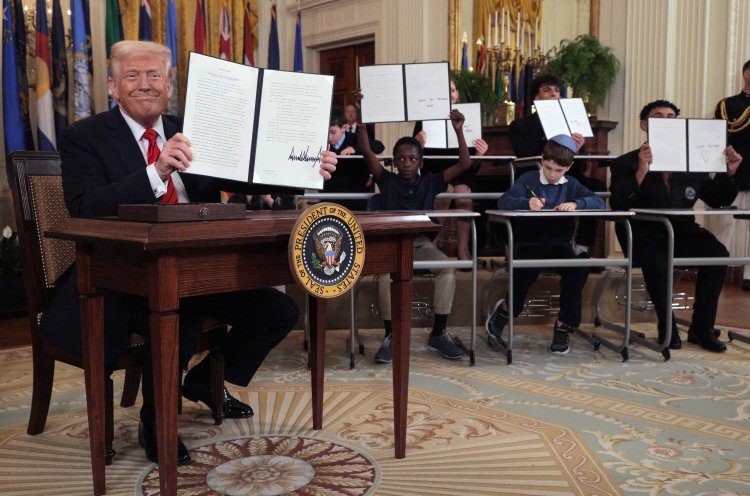Democrats Have Opportunity to Address 'a political void' in Trump's Education Agenda
In discussing education policy, former Chicago Mayor Rahm Emanuel highlighted the political landscape by stating, “That is where the politics are: ‘We made a mistake during Covid, and we’re going to fix it,’” in reference to Democrats.

Various Democratic lawmakers, teachers' union leaders, and former agency employees have protested outside the Education Department's headquarters and have initiated lawsuits in response to Trump’s efforts to downsize the department and its budget. These actions resonate with a progressive base eager to oppose the president's agenda.
Nonetheless, the next steps for the party are still being discussed. Some members argue that the prolonged school closures during the pandemic, debates around gender and race, and declining national test scores have opened a door for Trump’s political messaging. Others advocate for targeted policies to tackle school choice and testing issues, framing the dismantling of the Education Department as a threat to students. The direction the Democrats choose could significantly influence their electoral prospects.
“There is a political void being left by the Republicans and Donald Trump. That is an opportunity. Go fill it,” said Rahm Emanuel, the former Chicago mayor who previously clashed with the city’s teachers union. “In the past, we’ve had a standing on this issue — and a politically better position on this issue — than Republicans. We’ve frittered it away on secondary issues.”
Historically, Democrats were considered the more trusted party on education matters. However, the Covid pandemic dramatically shifted perceptions. Republican Glenn Youngkin's 2021 victory in the Virginia governor’s race was partly due to his conservative education message, which challenged racial teachings in schools and advocated for increased parental involvement in education.
Two years later, polls indicated that Democrats were either trailing or neck-and-neck with Republicans regarding which party would better prepare students for post-graduation life in four swing states.
Charles Barone, a former congressional advisor and vice president at Democrats for Education Reform, emphasized that the party needs “a more robust Democratic agenda that’s an alternative to Trump.” He added, “We need somebody that’s willing to speak truth to power, not hedge on the severity of the problems we’re facing for the kids we care about, and to really offer a bold set of initiatives that meet the moment.”
Several Democrats assert that the party possesses the necessary vision for education; the key lies in effectively communicating it. They are highlighting how Trump's budget cuts jeopardize programs for low-income students and could undermine efforts to support students with disabilities, a responsibility that states often struggle to manage. Despite Education Secretary Linda McMahon’s assurances that core funding for vulnerable children and K-12 schools will be safeguarded, the Department’s abrupt and sometimes chaotic attempts to reorganize raise concerns.
“Don’t make it about budgets and billionaires,” said Rep. Jahana Hayes. “Make it about the one position in the one school that affects this one family.” Hayes, a former high school history teacher, advocated for messaging that emanates from various community voices, including faith leaders and parents. “This affects everybody in the community, and they need to be part of the conversation and own working towards a solution,” she stated.
As Democrats attempt to engage voters through various strategies, some members, like Emanuel, urge the party to present a stronger alternative to Trump that emphasizes traditional education and distances itself from pandemic-era stances. “We lost focus on the classroom, and we discussed almost all the other issues around education but the ones that matter most to parents: reading, writing and math,” he reflected. “We got into the naming of the school, closing the front door during Covid for way too long, locker rooms, access to bathrooms, and we never dealt with the fundamentals of why parents send kids to schools.”
Emanuel further added: “That is where the politics are: ‘We made a mistake during Covid, and we’re going to fix it.’”
Trump has instructed his education chief to take “all necessary steps” to dismantle the Education Department; nearly half its staff has already been cut, and various grants and contracts have been canceled. While achieving the necessary Democratic votes in Congress to fully close the department seems improbable, there is a call for lawmakers to demonstrate the real-world effects of the administration’s policies by visiting local schools and engaging in discussions about funding for special education and low-income students.
Mary Kusler, senior director of advocacy for the National Education Association, remarked, “Eliminating the U.S. Department of Education in Washington, D.C., does not mean anything in Grand Island, Nebraska, or Pueblo, Colorado, because communities have no idea what the U.S. Department of Education does.” She emphasized that federal lawmakers have a significant opportunity to illustrate the direct impact of federal involvement in education on communities.
Democrats in Congress are pressing Trump’s Education Department to clarify how plans to reduce the agency's workforce will affect low-income students, striving to attract bipartisan attention. House appropriators have circulated information detailing how potential funding cuts for high-need schools would impact various districts. Virginia Rep. Bobby Scott, the top Democrat on the House Education and Workforce Committee, attempted to compel the agency to provide answers regarding these implications.
Led by Democratic appropriator Patty Murray and education committee ranking member Bernie Sanders, senators have urged McMahon to outline her plans for the agency in communications that also serve to articulate the party’s educational policy framework. Sen. Elizabeth Warren has initiated her own campaign to resist Trump’s efforts to dismantle the Education Department.
House Democratic leaders have enlisted their educator-turned-lawmaker members, such as Hayes and Rep. Mark Takano, to advocate for the agency, signaling a growing consensus that personal stories from students and families benefiting from federal education programs are critical in explaining the agency's role.
“People in poll after poll tell you they don’t want the Department of Education to close,” Sen. Chris Murphy stated. “This isn’t like a messaging problem for Democrats; this is a policy problem for Republicans — they are trying to do something really, really unpopular.” Recent polling indicates that 58 percent of Americans oppose eliminating the Education Department, despite Trump’s promise of enhancing the system by reallocating federal education funds “back to the states.”
However, while many Americans may not favor outright dissolution, opinions on the agency are mixed. According to data from the Pew Research Center, 45 percent of Americans expressed an unfavorable view of the agency last year, ranking it just slightly above the IRS and only below the Justice Department in negative perception.
Trump, McMahon, and other Republicans are advocating for significant reforms, emphasizing that math and reading scores have not improved despite substantial funding since the agency’s inception. “President Trump has made education reform a cornerstone of his agenda because of the Left’s multi-decade failure to prioritize student outcomes,” remarked department spokesperson Savannah Newhouse. “Instead, Democrats kept schools closed during Covid-19, leading to catastrophic learning loss, pushed radical ideology in the classroom, and have protested more about saving the careers of bureaucrats in Washington than about students’ plummeting math and reading scores.”
Countering Trump could prove difficult due to the strong animosity many GOP supporters harbor toward the Education Department; a Pew survey indicated that 64 percent of Republicans had an unfavorable opinion of it, compared to 27 percent who viewed it positively.
“They’re overinterpreting the public’s favorability toward our public education system,” noted Jim Blew, a former Education Department official during Trump’s first term. He commented on Democrats and their allies, stating, “People like the concept of public education, that is the commitment from the public to make sure children’s educations are funded — they’re not committed to what many on the right sometimes call ‘government schools.’”
Blew suggested that Democrats could galvanize public support by criticizing billionaire Elon Musk’s campaign for spending cuts. However, he cautioned that liberals risk losing credibility by exaggerating the impact of impending budget cuts and underestimating the public’s favor towards increased state control over federal education funding.
Overcoming Trump’s agenda will be a challenge, Takano admitted. “It is difficult because the base, the base Republicans, they take everything the president says very, very seriously, very literally,” he explained. “You say anything contrary, they’re going to call you a liar.”
Navid Kalantari for TROIB News












